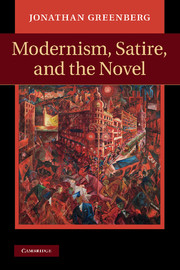Book contents
- Frontmatter
- Contents
- Illustration
- Preface
- Abbreviations
- Chapter 1 Satire and its discontents
- Chapter 2 Modernism's story of feeling
- Chapter 3 The rule of outrage: Evelyn Waugh's Vile Bodies
- Chapter 4 Laughter and fear in A Handful of Dust
- Chapter 5 Cold Comfort Farm and mental life
- Chapter 6 Nathanael West and the mystery of feeling
- Chapter 7 Nightwood and the ends of satire
- Chapter 8 Beckett's authoritarian personalities
- Notes
- Index
Chapter 3 - The rule of outrage: Evelyn Waugh's Vile Bodies
Published online by Cambridge University Press: 07 October 2011
- Frontmatter
- Contents
- Illustration
- Preface
- Abbreviations
- Chapter 1 Satire and its discontents
- Chapter 2 Modernism's story of feeling
- Chapter 3 The rule of outrage: Evelyn Waugh's Vile Bodies
- Chapter 4 Laughter and fear in A Handful of Dust
- Chapter 5 Cold Comfort Farm and mental life
- Chapter 6 Nathanael West and the mystery of feeling
- Chapter 7 Nightwood and the ends of satire
- Chapter 8 Beckett's authoritarian personalities
- Notes
- Index
Summary
Evelyn Waugh, even more than Wyndham Lewis, is probably the most enduring satirist among British modernists, though he rejected both labels for his own work. Yet while Lewis's reputation has undergone a triumphant rehabilitation in recent decades, Waugh still suffers from the preconception that his work is minor. Symptomatically, Fredric Jameson's Fables of Aggression, a book in part responsible for Lewis's soaring reputation, initiated its restorative project in 1979 precisely at Waugh's expense: “At best, in Britain today, [Lewis] retains a kind of national celebrity and is read as a more scandalous and explosive Waugh.” In other words, Waugh is merely a less scandalous and explosive Lewis – a less scandalous and explosive version, moreover, of the “old,” misread, unreconstructed Lewis, of Lewis the eccentric gadfly rather than of Lewis the radical innovator and analyst of modernity who emerges in Jameson's feverish study. Waugh's rejection of his contemporaries' emphasis on interiority and consciousness cannot wholly account for this omission, for this same rejection has been the very basis for the critical reinstallation of Lewis in the modernist canon. But Waugh has – despite some excellent critical efforts – yet to find a regular place in wider critical accounts of modernism. Located between the high and the low, he fits awkwardly into a narrative of the “great divide”; chronologically, he was born after the “men of 1914” but never belonged to the “Auden generation”; conservative but not extremist, his politics (unlike those of Lewis or Marinetti) have rarely proved interesting to dialecticians. Yet his sensibility exemplifies what I named the Uncle Fester Principle: the idea that modernism can be regarded as a kind of refusal of, or ambivalence toward, affective excess, particularly in the creation of or response to representations of suffering. It is therefore precisely as a satirist that Waugh is necessary to an account of modernism.
- Type
- Chapter
- Information
- Modernism, Satire and the Novel , pp. 47 - 69Publisher: Cambridge University PressPrint publication year: 2011



